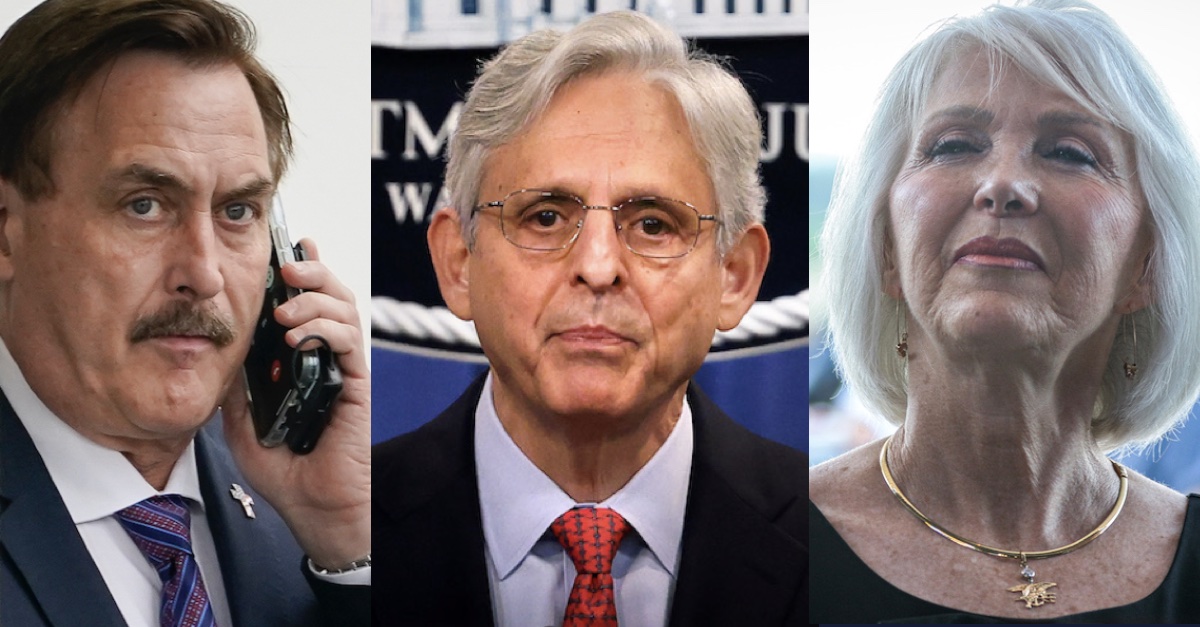
Mike Lindell (Drew Angerer/Getty Images), Merrick Garland (Kevin Dietsch/Getty Images), Tina Peters (Marc Piscotty/Getty Images)
A federal judge threw out a lawsuit against U.S. Attorney General Merrick Garland, finding that the government retaliation allegations made by an indicted former clerk in Colorado failed for the same reason that MyPillow CEO Mike Lindell’s claims failed in court.
Tina Peters, a Republican and ex-clerk in Mesa County, is currently on track for a state official misconduct trial in July, but as she awaited that day in court she tried to sue the federal government and Garland to shut down a federal investigation into potential identity theft, intentional damage to a protected computer, and conspiracy, a probe in which Peters and Lindell, among others, were identified as subjects in 2022.
When Peters filed her federal case, she also sued Colorado Secretary of State Jena Griswold (D) and Mesa County District Attorney Daniel Rubinstein, claiming altogether that she was being persecuted for asking questions about the “legitimacy” of President Joe Biden’s election in 2020 and warning about the security of future elections.
Peters, who was featured in the Lindell-funded 2020 election conspiracy movie “[S]election Code,” is accused at the state level of tampering with election equipment, attempting to influence public servants, and engaging in official misconduct by allowing an unauthorized third party to make copies of voting machine hard drives, leading “confidential digital images” of county Dominion Voting Systems equipment and passwords to be “published on the internet.”
Her lawsuit said that she “has never stated or intimated any willingness to compromise the lawful operation of Mesa County’s or any other voting system equipment” and that any suggestion that she did is part of a larger project to “punish and retaliate against her” for “question[ing] the integrity of the November 2020 election[.]”
On Monday, however, U.S. District Judge Nina Wang, a Biden appointee, said that Peters’ suit didn’t come close to succeeding — and the judge repeatedly referenced Lindell’s failed litigation when explaining why.
Like Lindell, Wang said, Peters’ equitable jurisdiction arguments did not succeed, so the judge didn’t even address the DOJ’s assertions that Peters lacked standing to sue and failed to state a claim.
Wang pointed out that the U.S. Court of Appeals for the Eighth Circuit had already jettisoned a “parallel case arising from the same events,” namely Lindell’s separate attempt to block the federal probe and to get his cell phone back following the FBI’s seizure of the device in a Hardee’s drive-thru in Minnesota.
The judge quoted the Eighth Circuit’s denial of Lindell, which warned that siding with him would “open the door” to “similar” lawsuits from others, like Peters, who were identified as subjects of the federal investigation:
While he has at times attempted to assert otherwise, Lindell’s objective in this action is apparent—this litigation is a tactic to, at a minimum, interfere with and, at most, enjoin a criminal investigation and ultimately hamper any potential federal prosecution related to his, or others, involvement in the public disclosure of forensic images of Mesa County’s election management servers. Affording such relief is not only contrary to the purpose of a preliminary injunction but would open the door to a deluge of similar litigation by those under criminal investigation.
Wang also pointed to the dismissal of pardoned former Trump campaign chairman Paul Manafort’s lawsuit against the DOJ:
Generally, a plaintiff cannot “use [a] civil action as a vehicle to attack a[n ongoing] criminal [investigation],” see Manafort v. U.S. Dep’t of Just., 311 F. Supp. 3d 22, 29 (D.D.C. 2018), and Ms. Peters fails to establish otherwise.
Citing the “strong judicial policy against intervening in ongoing criminal investigations,” the judge declined to block the probe, found Peters’ First Amendment arguments lacking, and concluded she did not show the government acted in “bad faith” or harassed her.
“For example, Ms. Peters’s assertion that ‘the Government announced its intention to deter free expression through a program that treats any individual who questioned the legitimacy of the 2020 presidential election as a ‘domestic violent extremist,”” the judge wrote, “is wholly unsupported by the allegations and ‘evidence’ on which Plaintiff relies.”
Again, Wang cited Lindell’s lawsuit in a footnote that pointed out that the U.S. Supreme Court refused to hear his case.
“Insofar as Ms. Peters directs the Court to the fact that a petition for writ of certiorari was filed in that case, the Court notes that the Supreme Court denied certiorari on April 15, 2024, Lindell v. United States, No. 23-950, 2024 WL 1607801,” the judge said, recounting that the Eighth Circuit also declined to exercise “equitable jurisdiction” in Lindell’s case.
Wang quoted the Eighth Circuit one more time for good measure when rejecting Peters’ First Amendment arguments.
“Plainly, the Attorney General’s statement ‘is not the Government threatening retaliation for speech or association,’ but is instead ‘the Government threatening criminal actions against people who are alleged to have violated federal law in their efforts to pursue audits…’ See Lindell, 639 F. Supp. 3d at 872,” the judge said, adding emphasis on her own.
As a result, Wang sided with the DOJ and tossed Peters’ lawsuit without prejudice, meaning her claims could be brought again.
Lindell, for his part, dropped his lawsuit following the SCOTUS rejection.
Read the dismissal here.
Have a tip we should know? [email protected]








